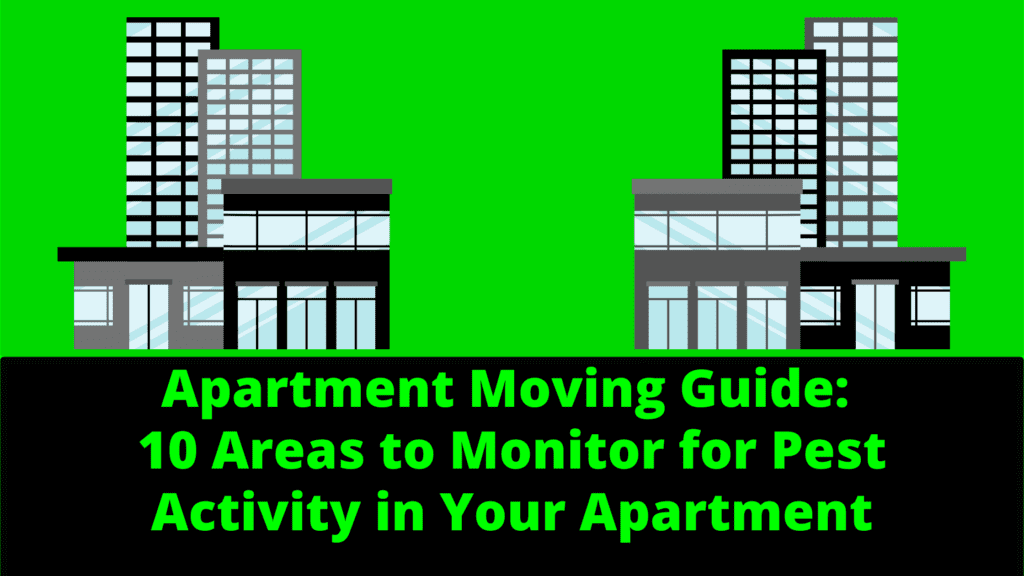Moving is a stressful time. Moving into a new home with pests makes it more stressful. Eliminate your stress, by learning 10 areas to monitor for pest activity in your apartment.
By learning where to check for pest activity, it helps give you peace of mind knowing you don’t have pests; and it helps pest control experts treat early on and effectively, so you don’t have the pest problem for as long.
Table of Contents
- Apartment life
- 10 areas to monitor for pest activity in your apartment
- What to do if you find pest activity in your apartment
- How we perform multi-family housing pest control
- Conclusion & next steps
Apartment Life
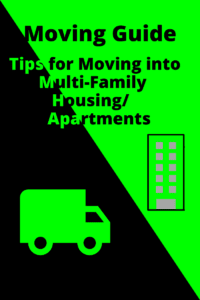 In our Moving Guide we touched on tips for moving into an apartment and 3 things to look for on move-in day: look for second-hand furnishings, use plastic containers, and inspect the backs of your appliances.
In our Moving Guide we touched on tips for moving into an apartment and 3 things to look for on move-in day: look for second-hand furnishings, use plastic containers, and inspect the backs of your appliances.
There are so many life-changes that bring reasons to move into an apartment. Maybe you’re moving out on your own for the first time; maybe you are moving in with your partner; maybe you just got out of a relationship; or maybe you’re downsizing.
Apartment life is a sort of communal life: it’s beautiful to live in community.
We wanted to showcase the importance of a fresh start, (whatever your fresh start is) and a fresh start includes NO pests.
In this post we will share with you tips of where to monitor for pest activity and what to do if you find pest activity in your apartment. For high quality Multi-Family Housing Pest Control, contact Done Right Pest Solutions.
10 Areas to Monitor for Pest Activity in Your Apartment
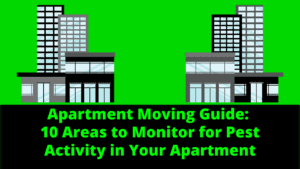
Pests can hide out in the wall voids during the day, and enter your apartment at night, if they are nocturnal. Most people sleep during the night and don’t often know they have pest issues.
It is important to keep an eye out for pest activity in your apartment and to notify management when or if you do come across activity.
In this section we will break down the different areas of your apartment and where to monitor for pest activity.
Kitchen
The kitchen is where the food is, and so, as a result, pests can often gravitate toward the kitchen. Some pests may make their home in the kitchen, others simply visit unwanted. Kitchens are a vital place to check for pest activity in your apartment.
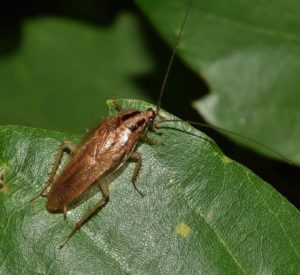
Cockroaches are a common kitchen pest. You can monitor for them in cabinets. You may see exoskeletons of their molts, droppings, or dead or live cockroaches themselves.
If you do a deep cleaning of your kitchen and pull out your refrigerator or stove, you can see if there are any more exoskeletons, live or dead activity back there as well.
Appliances have electricity coursing through the wires, so there is heat. They are pushed back against a wall, too, so there is darkness. Finally, with access to a sink where there could be standing water, cockroaches also have access to dampness or moisture, which is another of their favorite things.
Keep your kitchen clear of excess food and water to take away their food source. And a local pest control company, like Done Right Pest Solutions can be hired to tackle these kitchen pests.
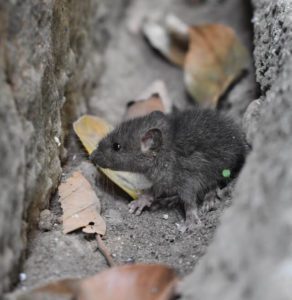
Mice are a common apartment pest. Mice will often live in wall voids, but come out for food and water. Mice find their food in our kitchens, pet bowls, storage, pantries, and other areas of our homes.
Mice have no bladder control, so they leave mouse droppings wherever they go. Look around for their droppings to determine whether there is mouse activity.
You may also look under the sink or behind the stove for traps or bait stations, a sign that there has been previous mouse activity. That stated, if there are rodent control devices, all you have to do is monitor them and then notify your manager, as there is most likely already a pest control company in place for this pest issue.
Pantry moths can be a nuisance in kitchen and pantries. Though they are not common, it is important to be on the lookout for their larvae- a white, worm-like creature, that will molt into moths. The same can be said of pantry beetles, powder post beetles, and carpet beetles.
Fruit flies can be a nuisance in kitchens. Whenever there is food residue in drains, it becomes the perfect breeding ground for these pests. Fruit flies don’t inhabit a space just because of fruit.
Bathrooms
The bathroom, while it holds no food, it does hold water. Tubs, showers, sinks, and toilets hold water and all living things need water to survive.
Cockroaches can hide out in bathrooms as well, under the sinks or behind sinks and toilets. The damp and humid environment of the bathroom is perfect for cockroaches.
Springtails love water. These bugs are flea-like in size and movement, but are not fleas. They don’t use humans or pets as a host, but they can be a nuisance, multiplying and jumping on your bathroom items.
Drain flies can be a nuisance in kitchen and bathrooms alike. For this reason, likewise, bathrooms are a vital place to check for pest activity in your apartment.
Living Room
Few pests like to hang out where humans hang out. That stated, pests can hide in wall voids of living rooms, with quick access to the dark when humans are present.
Bed bugs can inhabit wall voids, couch cushions, carpets, and along the baseboards of living rooms if bed bugs are present in other bedrooms of the apartment.
Hornets and wasps can become a problem in air conditioning units, which are more commonly placed near or in living room windows.
Your home is your sacred space, and rightly so. Living rooms are often a place you can relax, but how can you relax with pests? Make sure to include living rooms in your inspection for pest activity in your apartment.
Decks & Patios
Carpenter ants will often hang out on decks and patios, especially if the deck is made of wood or if they have access to a wall void. Carpenter ants pose no threat to humans other than they build with wood and destroy structures over time.
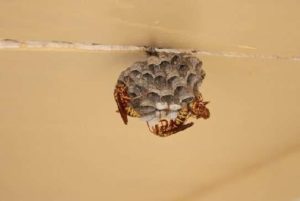 Hornets and wasps often make their homes on decks and patios. They can build nests under an overhang, on or in a window or door frame, in a wall void, and other places. Because these pests can sting, it is important to keep an eye out for any small nests, better to catch them before they get out of hand.
Hornets and wasps often make their homes on decks and patios. They can build nests under an overhang, on or in a window or door frame, in a wall void, and other places. Because these pests can sting, it is important to keep an eye out for any small nests, better to catch them before they get out of hand.
Decks and patios are a good area to include in your inspection of pest activity in your apartment.
Bedrooms
Like living rooms, there aren’t many pests that like to hang out in bedrooms.
Bed bugs will often hide in wall voids or crevices of mattresses, going unnoticed for some time (whether weeks or months). It is important to know the warning signs of bed bugs, so they don’t spread.
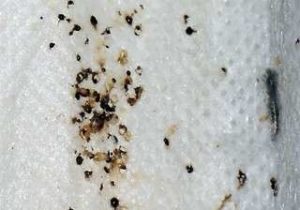 Fecal material collects on mattresses, so you may see black spots on mattresses or box springs. Casings can be left around the bed or the wall voids from one of their molts. Check your sheets for blood marks. While not everyone itches or notices any raised bite marks on their skin, blood may still pool in little dots on your sheets. These are simple ways to monitor for bed bug activity.
Fecal material collects on mattresses, so you may see black spots on mattresses or box springs. Casings can be left around the bed or the wall voids from one of their molts. Check your sheets for blood marks. While not everyone itches or notices any raised bite marks on their skin, blood may still pool in little dots on your sheets. These are simple ways to monitor for bed bug activity.
Bed bugs spread easily in apartments, but also just with travel and holidays with guests sleeping over at a friend’s or family member’s home.
Because bedrooms are our sacred place, where you are most vulnerable while you sleep, it is vital to check your bedrooms for pest activity in your apartment.
Hallways & Common Areas
When you are walking through the halls of your apartment building, keep an eye out for pest activity. Some pests that are sometimes seen in hallways are ants, spiders, and cockroaches.
Ants and spiders are common pests and don’t usually freak too many out. Still, it’s good to have them treated as soon as you notice them, so they don’t get out of hand.
If you see cockroaches in the hallway, it can signify an infested unit. Cockroaches can spread from unit to unit easily, if left untreated.
Simply notify management as soon as you can on the type of pest and where you saw them.
Hallways and common areas don’t pose as much of a threat to the sanctuary of our homes, but pests can spread through hallways and common areas, just like through wall voids and vents. If you notice anything while you’re walking through, know that the pest activity in the halls could get into your apartment.
Storage & Laundry Rooms
Storage rooms and laundry rooms can be home to many creepy crawly pests, as well as rodents.
Mice often will feel more at home with the warmth of the laundry machines, the furnace or boiler. Spiders, centipedes and millipedes also make their homes in the dark, secluded basements that are often home to laundry rooms and storage rooms.
Cockroaches and bed bugs have been known to inhabit storage rooms if a tenant brings them into a storage unit.
Having a commercial pest control company on call and on retainer for regular service is a quality of life upgrade many apartment complexes offer and the EPA highly recommends it.
What to Do if You Find Pest Activity in Your Apartment
If you find pest activity in your apartment, first we recommend that you gain all of the facts before you ever attempt treating yourself. Too often we will be informed of a unit where the tenant set off a bug bomb to get rid of the cockroaches.
These bug bombs are not safe for pets or humans to be around, and it probably isn’t something neighbors want set off without their knowing, but it happens.
These bug bombs are repellents that drive the cockroaches away from the source of the bug bomb, but don’t kill them. Cockroaches are pretty resilient, known to withstand radiation and nuclear blasts.
These cockroaches will simply inhabit the surrounding units, which would, understandably, frustrate your neighbors.
If you live in an apartment complex, we never recommend that you treat your pest issue. We recommend you notify the manager or owner and remain calm.
While there are things you can do, and once you notify management and they give the OK to repel the mice from your unit, there are some natural things you can do. We always recommend a strong defense of storing food properly in airtight containers and regularly cleaning. From there, you can seal up holes under cabinets, heaters, and water pipes, or have maintenance do this. Try repelling mice naturally with peppermint oil or lavender oil. For more tips, check out Redfin’s Ultimate Guide on How to Get Rid of Mice in Your Apartment.
Notify the Manager
Property managers are aware of some of the pest issues going on within a structure, but they aren’t always aware of all of them. Notifying management of an issue is more effective than letting the problem go untreated or treating the pest issue.
If you notice pest activity in your apartment, notify the manager or owner. Once you notify management, they can hire the right company for the job. Commercial pest control companies, like Done Right Pest Solutions have commercial-grade products that are EPA and FDA approved. These products aren’t simply some over-the-counter bait or poison.
Management often keeps records of pest issues if they have a pest control company on retainer. Notifying the manager maintains the service quality, as the managers can decide if the company treating the pest issues is getting the job done right, eradicating the pests.
It’s important to us that property managers don’t overpay for pest control services.
For other tips and tricks regarding commercial pest control, check out this category within our blog.
Keep Calm
All pest issues are typically not solvable overnight. So, take a breath and stay calm. While no one wants to live with pests, most pests are more of a nuisance than a threat to your health.
There are a few pests that carry and spread diseases, but once you know that you have pests, you can clean accordingly and ensure that you don’t touch anything they touch and then touch your eyes, nose, or mouth.
Once a pest control company has treated, give the treatment time. Quick treatments often do not attack the source of the problem, and often cockroaches or mice can come back easily if the technician does not take his or her time in inspection, identification, treatment, and follow-up.
Done Right Pest Solutions has expert technicians that seek to solve the pest issue at the source, not cover up a problem or mask it.
How We Perform Multi-Family Housing Pest Control
Done Right Pest Solutions offers an extensive approach to Multi-Family Housing Pest Control.
We have a base service that we provide for the number of units in the building or complex. We have a base service that we provide for the common areas within the building or complex. And, we have a base service that we provide for the exterior exclusion and bait station maintenance that we provide for the exterior of the building(s).
Then we offer additional services to fit the needs and budget of the building or complex. These services include:
- Regular inspection and preventative treatment of units for a low cost, usually spread out weekly throughout the course of the year, guaranteeing that we enter every unit at least one time per year
- Exterior seasonal sprays of the building(s) to deter and mitigate any crawling insects from entering seasonally
- Mosquito and tick services for patios and outdoor common areas from May through September
Each property is different and each pest problem is different. Call today if you’d like a free walkthrough of the property you own or manage: 651-342-9489. We first inspect and assess your needs before we come up with a treatment plan. We don’t believe in any sort of “one-size-fits-all” mentality.
Conclusion & Next Steps
You learned quite a bit in this extension post of the original Moving Guide. You learned about how apartment life is a communal sort of life: it’s beautiful. We explained where to monitor for pest activity within the kitchen, bathroom, living room, decks and patios, bedroom, hallways and common areas, and storage and laundry rooms.
We even explained exactly what to do if your find pest activity in your apartment: notify the manager and keep calm are the 2 most important things to do. We also explained how we perform Multi-Family Housing Pest Control in brief.
If you own or operate an apartment building or complex in need of pest control, please give us a call. We’d love to help you sort through your pest issues and solve them for you.
Give us a call or text us at 651-342-9489 or email us at donerightpestsolutions@gmail.com.
We’re here when you need us,
Done Right Team
Was this guide helpful? Have you ever moved and gained pests in your space? How did you deal with them? We would love to hear of your experience below!
Want to learn more tips and tricks regarding pest control? We offer tailored content! Subscribe to our free email newsletter.

